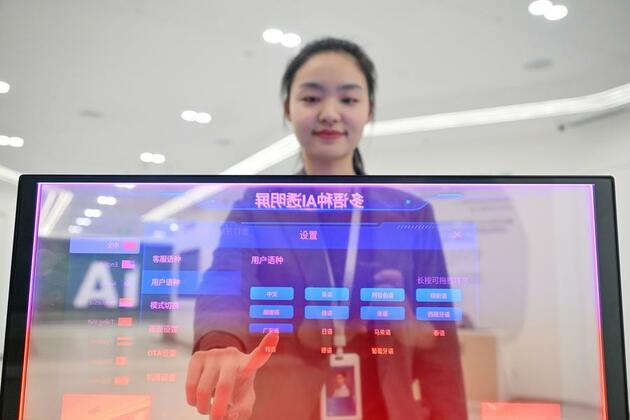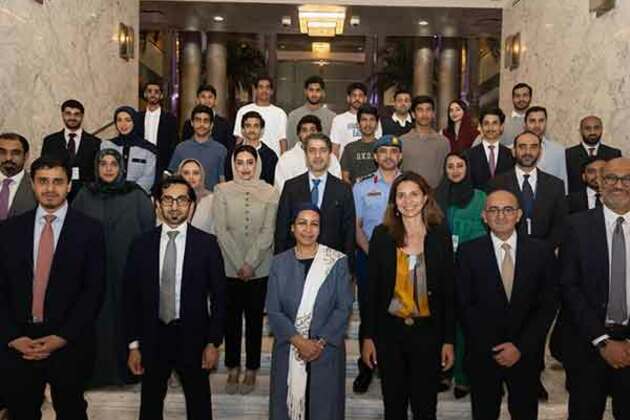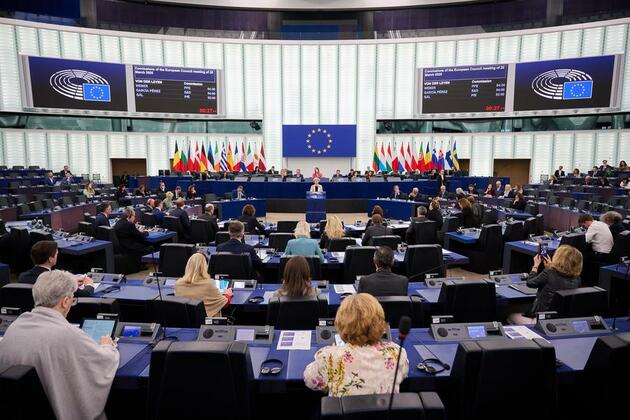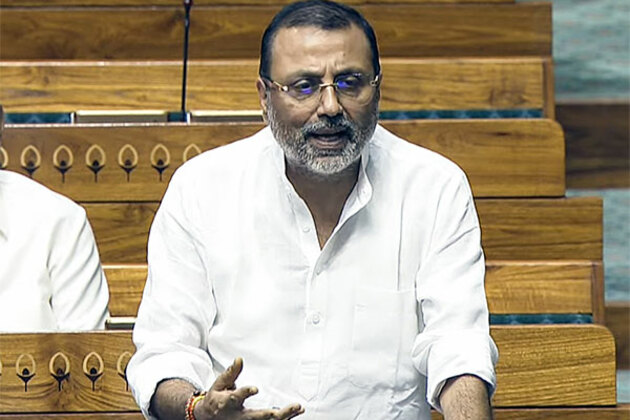From ink pens to AI, Chinese translators embrace tech surge
Xinhua
28 Apr 2025, 14:45 GMT+10

A staff member shows a multi-language AI real-time translation system with transparent screen at Tianjin branch of iFLYTEK in Tianjin, north China, April 18, 2025. (Xinhua/Sun Fanyue)by Xinhua writer Wang AihuaBEIJING, April 28 (Xinhua) -- Chai Mingjiong, a seasoned translator and translation instructor with Shanghai International Studies University (SISU) in east China, recently reminisced about his experiences of utilizing ink pens to meticulously translate documents for the United Nations during the 1980s.Back then, he had to visit libraries and even engage in discussions with professionals from different industries to gather necessary references. "Now, things have changed a lot, particularly with the emergence of artificial intelligence (AI) technologies," said Chai, who founded the prestigious Graduate Institute of Interpretation and Translation at SISU in 2003.In just a few decades, the translation landscape in China, a populous economic giant with high demand for cross-cultural communication, has undergone seismic shifts -- from simple pens and dictionaries to modern computers equipped with electronic glossaries, and now, rapidly evolving AI technology.This era of technological marvels has presented translators in the country with unparalleled opportunities, alongside unprecedented challenges, shaping the profession in ways never imagined before.At the annual gathering of the Translators Association of China (TAC), which took place last week in Dalian, northeast China's Liaoning Province, AI once again took center stage in discussions.A report on AI and translation, presented by TAC at the meeting, revealed the remarkable journey of AI translation technology, evolving from being a mere subject of intrigue in laboratories to being embraced widely in commercial settings throughout the nation. Its influence has permeated vital industries, including cross-border trade, cultural exchange, education, and healthcare, among others.In 2024, the proportion of Chinese enterprises using translation technology to complete translation tasks reached 97.1 percent, an increase of 2.5 percent compared with 2023; the proportion of practitioners using such technology to complete translation tasks reached 97.7 percent, the TAC revealed at the meeting.The report said that by the end of 2024, the number of companies specializing in "machine translation" or "AI translation" had grown to 1,545 -- marking an increase of over 700 compared to the previous year.It also highlighted the integration of AI translation technology into multimodal applications, leading to the rapid emergence of smart translation devices.Industry insiders noticed a tendency among clients to push for lower rates due to competition from AI. However, in 2024, over 80 percent of translation firms reported growth in their operating income or maintained it at the same level compared with 2023.Stephanie Zhu, owner of a Shanghai-based translation firm, told Xinhua that while it's difficult to quantify the exact impact of AI translation technology on their business, it has undoubtedly altered the work patterns of translation professionals."AI technology can be effectively used for highly replicable texts, optimizing translation processes and boosting productivity," she explained.Latest TAC data reveals that China has approximately 6.8 million translation professionals across the country, with a continuous influx of fresh talent and a growing overall demand within the sector.Recent years have seen significant advancements in China's translation capabilities, fueled by AI technologies, particularly large language models. These models have demonstrated remarkable progress not just in text translation but also in the concurrent handling of speech, images and video content -- facilitating multimodal translation.Du Zhanyuan, president of the TAC, has emphasized the necessity for the industry to embrace innovations driven by AI.Translation is one of the fields where AI applications currently excel, Du was quoted as saying by a CGTN report. He added that harnessing these new technologies can reshape workflows, enhance productivity and unleash unprecedented potential for the profession.The TAC report highlighted the benefits and positive impacts of AI translation in various fields, including cross-border e-commerce, international conferences, live-streaming scenarios, cultural exchange, technological innovation and industry infrastructure upgrading.However, the report also exposed challenges such as technical limitations, uneven language support, inadequate cultural adaptability, ethical controversies, and potential disruptions to employment.Gao Anming, executive vice president and secretary-general of the TAC, advocated for greater involvement of translation and international communication experts in the iterative development of large AI models."High-quality data, expert feedback and application scenario needs can propel the optimization and upgrading of AI technology services," Gao stated during a seminar earlier this year.He underscored that the future of the translation industry lies in the complementary interaction between human translators and AI, fostering mutual development.Driven by advancements in AI technologies, translation education in China is undergoing a comprehensive transformation. Universities are increasingly offering courses in translation technology to nurture professionals proficient in both linguistic and technical skills.Furthermore, several institutions have begun integrating translation programs with computer science and AI -- introducing dual degree initiatives.Chai compared translators to doctors, who regularly use advanced AI tools to examine patients, but still make the final decision for diagnosis."AI technology has raised the bar for translators, thus emphasizing the need for universities to prioritize bridging the 'last mile' in fostering translation talent and facilitating a seamless transition from academic settings to industrial workspaces," Chai noted.
 Share
Share
 Tweet
Tweet
 Share
Share
 Flip
Flip
 Email
Email
Watch latest videos
Subscribe and Follow
Get a daily dose of International Technology news through our daily email, its complimentary and keeps you fully up to date with world and business news as well.
News RELEASES
Publish news of your business, community or sports group, personnel appointments, major event and more by submitting a news release to International Technology.
More InformationComputers
Section"Adding insult to injury": Fadnvis hits out Wadettiwar amid row over latter's remarks on Pahalgam terror attack
Mumbai (Maharashtra) [India], April 28 (ANI): Maharashtra Chief Minister Devendra Fadnavis on Monday hit out at senior Congress leader...
From ink pens to AI, Chinese translators embrace tech surge
A staff member shows a multi-language AI real-time translation system with transparent screen at Tianjin branch of iFLYTEK in Tianjin,...
Ministry of Finance organises awareness session for Emirati students in Washington
Washington DC [US], April 28 (ANI/WAM): The Ministry of Finance organised an awareness session at the UAE Embassy in Washington, DC,...
Top 5 Mistakes People Make After Accidental Data Deletion
HT Syndication New Delhi [India], April 28: Among the numerous data loss scenarios faced by individuals and businesses, accidental...
Mumbai: Fire breaks out at ED office, important government files destroyed
Mumbai (Maharashtra) [India], April 27 (ANI): A fire broke out at the Enforcement Directorate (ED) office in Mumbai on Sunday, an official...
World Insights: From weal to woe, EU discards blind faith in Washington
European Commission President Ursula von der Leyen addresses the European Parliament in Strasbourg, France, April 1, 2025. (European...
Internet
SectionIreland backs ban on algorithmic feeds targeting children
DUBLIN, Ireland: Social media companies could soon be required to disable addictive algorithm-driven feeds for children, under a new...
India's Got Latent: SC orders release of Ranveer Allahabadia's passport
New Delhi [India], April 28 (ANI): The Supreme Court on Monday ordered the release of the passport of YouTuber and Podcaster Ranveer...
SC issues notice to Centre, OTT, social media platforms on PIL against obscene content
New Delhi [India], April 28 (ANI): The Supreme Court on Monday issued notice to the Centre, OTT and social media platforms on a PIL...
"Our son is NOT a topic for your entertainment": Sanjana Ganesan slams trolls for mocking Angad Bumrah
New Delhi [India], April 28 (ANI): India pace spearhead Jasprit Bumrah wife and renowned sports broadcaster, Sanjana Ganesan has launched...
India bans 16 Pakistani YouTube channels over misinformation; Centre writes to BBC over Pahalgam reportage
New Delhi [India], April 28 (ANI): India on Monday announced a ban on 16 Pakistani YouTube channels for spreading provocative and communally...
"New face of Pakistani terrorism has surfaced": BJP's Nishikant Dubey on Pakistani girls married in India
New Delhi [India], April 28 (ANI): Bharatiya Janata Party MP Nishikant Dubey on Monday raised concerns over what he termed the 'new...












